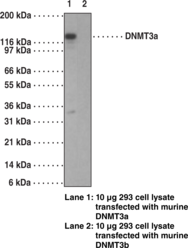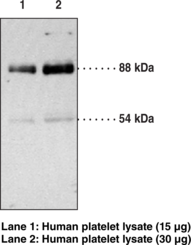Description
Methylation of DNA at cytosine residues plays an important role in regulation of gene expression, genomic imprinting and is essential for mammalian development. Hypermethylation of CpG islands in tumor suppressor genes or hypomethylation of bulk genomic DNA may be linked with development of cancer. To date, three families of mammalian DNA methyltransferase genes have been identified which include DNMT1, DNMT2, and DNMT3. DNMT1 is constitutively expressed in proliferating cells and inactivation of this gene causes global demethylation of genomic DNA and embryonic lethality. DNMT2 is expressed at low levels in adult tissues and its inactivation does not affect DNA methylation or maintenance of methylation. The DNMT3 family members, DNMT3a and DNMT3b, are strongly expressed in ES cells but their expression is down regulated in differentiating embyonic stem (ES) cells and is low in adult somatic tissue. It has been shown that naturally occurring mutations of DNMT3b gene occurs in patients with a rare autosomal recessive disorder, termed ICF (immunodeficiency, centromeric instability, and facial anomalies) syndrome.
Synonyms: DNMT3a
Immunogen: recombinant mouse Dnmt3a expressed in bacteria. The epitope was found to be located near the C-terminus (amino acids 705-908)
Formulation: 100 µg of protein G-purified IgG in 200 µl PBS containing 0.05% BSA and 0.05% sodium azide
Isotype: IgG1κ
Applications: WB, IF/ICC, ChIP, and IHC (paraffin)
Origin: Animal/Mouse
Stability: 365 days
Application|Immunocytochemistry||Application|Immunofluorescence||Application|Immunohistochemistry||Application|Western Blot||Product Type|Antibodies|Monoclonal Antibodies||Research Area|Epigenetics, Transcription, & Translation|Writers|DNA/RNA Methylation


